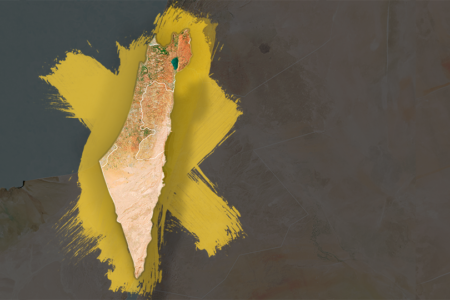The Return of the Two-State Solution
It’s back. Hamas’s October 7 slaughter of more than 1,200 Israelis and Israel’s military response have revived international calls for a so-called two-state solution to the Israeli-Palestinian conflict. This plan envisions an independent Palestinian state alongside the State of Israel, with both states sharing Jerusalem as their capital.
U.S. Secretary of State Antony Blinken called for a “clear, credible, time-bound path to the establishment of a Palestinian state.” Germany’s Foreign Minister Annalena Baerbock said a Palestinian state is the “only solution” to the conflict. Her French counterpart, Stéphane Séjourné, agreed: “We need a Palestinian state with security guarantees for all.” The United Kingdom’s Foreign Secretary David Cameron floated the idea of recognizing a Palestinian state to make the process of negotiating a two-state solution “irreversible.”
The European Union’s (EU) Foreign Policy Chief Josep Borrell drafted a 10-point roadmap for a “credible, comprehensive” solution to the Israeli-Palestinian conflict. “We believe that a two-state solution should be imposed from the outside to bring peace,” he said.
Israel’s Prime Minister Benjamin Netanyahu rejected the idea, claiming a Palestinian state would become a launching pad for attacks on Israel. “I will not compromise on full Israeli security control over all the territory west of Jordan—and this is contrary to a Palestinian state,” he posted on social media. A day later, his office issued a statement: “In his conversation with President Biden, Prime Minister Netanyahu reiterated his policy that after Hamas is destroyed, Israel must retain security control over Gaza to ensure that Gaza will no longer pose a threat to Israel, a requirement that contradicts the demand for Palestinian sovereignty.”
Predictably, Netanyahu’s comments sparked outrage. UN Secretary General António Guterres said Netanyahu’s “repeated refusal” to accept a two-state solution is “totally unacceptable.” Ireland’s Foreign Minister Micheál Martin urged the Israeli prime minister to “listen to the vast majority of the world who want a peace and who want a two-state solution.” Latvia’s Foreign Minister Krišjānis Kariņš called on the EU to force concessions from Israel. “Europe’s largest leverage has always been its wallet,” he said. “We see that, in internal EU politics, money can help to focus minds; and I think we should start thinking about this internationally.”
However, few Israelis or Palestinians endorse a two-state solution. A recent Gallup poll found only one in four Israeli adults support an independent Palestinian state, while 65% oppose it. Another poll found that only 24% of Palestinians support a two-state solution. Moreover, almost three out of four Palestinians believe Hamas’s October 7 attack on Israel was correct, according to the Palestinian Center for Policy Survey and Research.
Hamas leader Khaled Mashal firmly rejected a two-state solution “because it means . . . you are required to recognize the legitimacy of the other state, which is the Zionist entity. This is unacceptable.” Instead, he called for a one-state solution requiring Israel’s elimination. “Following October 7, I believe that the dream and the hope for Palestine from the river to the sea, and from the north to the south, has been renewed . . . from Rosh Hanikra [the farthest point north on Israel’s Mediterranean coastline] to Eilat [Israel’s southernmost city].”
Addressing the World Economic Forum in Davos, Switzerland, in January, Israeli President Isaac Herzog said that after October 7, “no Israeli in their right mind” is thinking of a Palestinian state. “Everybody wants to know: Can we be promised real safety in the future? Every Israeli wants to know that he will not be attacked in the same way from north or south or east.”







